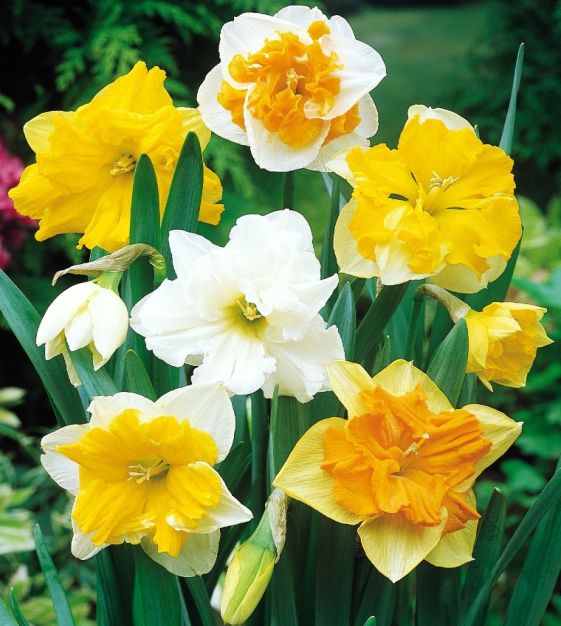-
- Website Specials
- New for 2025!
- Tulips
- Narcissi
- Allium
- Anemone blanda
- Brodiaea
- Camassia
- Chionodoxa
- Corydalis
- Crocus
- Eranthis
- Eremurus
- Erythronium
- Fritillaria
- Galanthus
- Geranium
- Gladiolus
- Hyacinths
- Hyacinthoides
- Ipheion uniflorum
- Dutch Iris
- Rock Garden Iris
- Ixiolirion
- Leucojum Aestivum
- Muscari
- Ornithogalum
- Oxalis
- Puschkinia
- Scilla
- Lilies
- Peonies
- Tender Bulbs
- Anemone Giants
- Tecolote Ranunculus
- Freesias
- Paperwhites
- Amaryllis
The Butterfly Narcissus Mixture
Our special mixture of Split-Cup Narcissi includes Collar- and Papillon-type Narcissi Bella Estrella, Blazing Starlet, Cassata, Hungarian Rhapsody, Orangery and Parisienne. Narcissus Classes: Split-cup Collar and Papillon (Royal Horticultural Society Division 11). Bulb size: DNII. April. HZ: 4-8. Height: 16".
Narcissi are The Art & Soul of Spring.
Narcissus Horticultural Tips
Narcissi are The Art & Soul of Spring.
Narcissus Horticultural Tips
- Information
Naturalizing Narcissus Mixtures
Of all flower bulbs, the one that lends itself most readily to naturalizing is the Narcissus. Narcissi adapt themselves to diverse types of soil, however, the better the soil, the sooner they will develop into mature plantings. Never plant Narcissi in poorly draining areas where they would have "wet feet". Narcissi do well in full sun as in semi-shade. We find that they do best in filtered sunlight where their flowers last longer and their color develops more fully. The foliage also stays green longer, thus providing better bulbs for flower production in future years. Pink Narcissi are particularly grateful for filtered sunlight. Large Narcissi plantings are wonderful along woodland edges, particularly since they are not normally eaten by either deer or rodents. Regular fertilizer feeding is critical to the development of naturalized Narcissi plantings. Allow both the flower and the foliage to bloom and die back naturally. Do not mow naturalized Narcissi and do not tie up foliage. Let the foliage breathe so that it may benefit from the photosynthesis through sunlight. In times of drought, don't forget to water your Narcissus plantings lightly Click here for more Narcissi Horticultural Tips. Our prized mixtures do not consist of cast-off seedlings, but of double-nose, named varieties that naturalize well and that will provide spectacular color over the longest period of time. These are quite probably the best narcissi mixtures available in all of the United States. Bulb size: DNII, varies by variety. Bloom time: April/May. Plant 6" to 8" deep and 6" apart; the Miniature Mix maybe planted a little closer together. Horticultural zones 3-7, depending upon the variety. Height: 6" to 20".
Narcissi are The Art & Soul of Spring.
Narcissus Horticultural Tips
Of all flower bulbs, the one that lends itself most readily to naturalizing is the Narcissus. Narcissi adapt themselves to diverse types of soil, however, the better the soil, the sooner they will develop into mature plantings. Never plant Narcissi in poorly draining areas where they would have "wet feet". Narcissi do well in full sun as in semi-shade. We find that they do best in filtered sunlight where their flowers last longer and their color develops more fully. The foliage also stays green longer, thus providing better bulbs for flower production in future years. Pink Narcissi are particularly grateful for filtered sunlight. Large Narcissi plantings are wonderful along woodland edges, particularly since they are not normally eaten by either deer or rodents. Regular fertilizer feeding is critical to the development of naturalized Narcissi plantings. Allow both the flower and the foliage to bloom and die back naturally. Do not mow naturalized Narcissi and do not tie up foliage. Let the foliage breathe so that it may benefit from the photosynthesis through sunlight. In times of drought, don't forget to water your Narcissus plantings lightly Click here for more Narcissi Horticultural Tips. Our prized mixtures do not consist of cast-off seedlings, but of double-nose, named varieties that naturalize well and that will provide spectacular color over the longest period of time. These are quite probably the best narcissi mixtures available in all of the United States. Bulb size: DNII, varies by variety. Bloom time: April/May. Plant 6" to 8" deep and 6" apart; the Miniature Mix maybe planted a little closer together. Horticultural zones 3-7, depending upon the variety. Height: 6" to 20".
Narcissi are The Art & Soul of Spring.
Narcissus Horticultural Tips
Naturalizing Narcissus Mixtures
Of all flower bulbs, the one that lends itself most readily to naturalizing is the Narcissus. Narcissi adapt themselves to diverse types of soil, however, the better the soil, the sooner they will develop into mature plantings. Never plant Narcissi in poorly draining areas where they would have "wet feet". Narcissi do well in full sun as in semi-shade. We find that they do best in filtered sunlight where their flowers last longer and their color develops more fully. The foliage also stays green longer, thus providing better bulbs for flower production in future years. Pink Narcissi are particularly grateful for filtered sunlight. Large Narcissi plantings are wonderful along woodland edges, particularly since they are not normally eaten by either deer or rodents. Regular fertilizer feeding is critical to the development of naturalized Narcissi plantings. Allow both the flower and the foliage to bloom and die back naturally. Do not mow naturalized Narcissi and do not tie up foliage. Let the foliage breathe so that it may benefit from the photosynthesis through sunlight. In times of drought, don't forget to water your Narcissus plantings lightly Click here for more Narcissi Horticultural Tips. Our prized mixtures do not consist of cast-off seedlings, but of double-nose, named varieties that naturalize well and that will provide spectacular color over the longest period of time. These are quite probably the best narcissi mixtures available in all of the United States. Bulb size: DNII, varies by variety. Bloom time: April/May. Plant 6" to 8" deep and 6" apart; the Miniature Mix maybe planted a little closer together. Horticultural zones 3-7, depending upon the variety. Height: 6" to 20".
Narcissi are The Art & Soul of Spring.
Narcissus Horticultural Tips
Of all flower bulbs, the one that lends itself most readily to naturalizing is the Narcissus. Narcissi adapt themselves to diverse types of soil, however, the better the soil, the sooner they will develop into mature plantings. Never plant Narcissi in poorly draining areas where they would have "wet feet". Narcissi do well in full sun as in semi-shade. We find that they do best in filtered sunlight where their flowers last longer and their color develops more fully. The foliage also stays green longer, thus providing better bulbs for flower production in future years. Pink Narcissi are particularly grateful for filtered sunlight. Large Narcissi plantings are wonderful along woodland edges, particularly since they are not normally eaten by either deer or rodents. Regular fertilizer feeding is critical to the development of naturalized Narcissi plantings. Allow both the flower and the foliage to bloom and die back naturally. Do not mow naturalized Narcissi and do not tie up foliage. Let the foliage breathe so that it may benefit from the photosynthesis through sunlight. In times of drought, don't forget to water your Narcissus plantings lightly Click here for more Narcissi Horticultural Tips. Our prized mixtures do not consist of cast-off seedlings, but of double-nose, named varieties that naturalize well and that will provide spectacular color over the longest period of time. These are quite probably the best narcissi mixtures available in all of the United States. Bulb size: DNII, varies by variety. Bloom time: April/May. Plant 6" to 8" deep and 6" apart; the Miniature Mix maybe planted a little closer together. Horticultural zones 3-7, depending upon the variety. Height: 6" to 20".
Narcissi are The Art & Soul of Spring.
Narcissus Horticultural Tips





